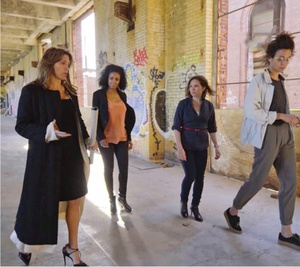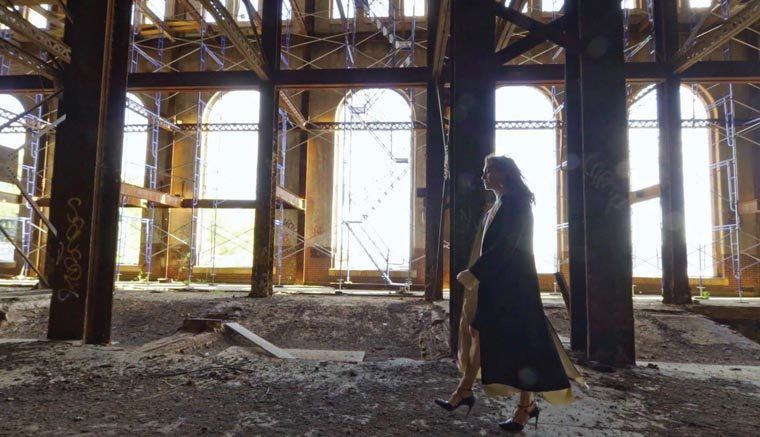Lela Goren is Paving the Way for the Empowerment of Women
“It’s in my DNA,” confesses New York developer, Lela Goren, referring to a strong work ethic which drives her to be a ‘fearless warrior’ in both her personal and professional lives.
Goren, the founder of New York-based a real estate development company the Lela Goren Group, undertakes large-scale development projects that are meaningful to her- often breathing new life into once forgotten buildings and transforming them into magical spaces.
Her eclectic career path is astounding – a distinguished developer for over 15 years, (she is the recipient of the 2016 Women Builders Council Developer of the Year Award) Goren is also an intellectual property lawyer with a master’s degree in international law. Before attending law school, she played professional basketball for the University of Jerusalem.
Whether Goren is acquiring properties and building them with the support of her in-house team or most recently serving as vice chair at WeWork, at the heart of her work is a desire to create “physical spaces that inspire communities to have innovative collisions that may lead to establishing social change.”
She began her training in real estate development and investment with Extell Developments. “This is where I learned about what to do and what not to do,” she says.

Goren with her children outside the PowerHouse. (Photo courtesy of Lela Goren)
Currently, Goren is three projects in the works, the first of which is the Glenwood Power Plant. Designed by architects Charles Reed and Alan Stern, it was constructed in the early 1900s for the electrification of Grand Central Station. The Goren group purchased the property in 2012, renaming this Romanesque-Revival style building, The PowerHouse. It is slated to open in a few years with the goal of being a platform for the global environmental movement as well as large-scale events in the Turbine Hall (which has over 1 million cubic feet of space). Goren is in the process of converting a nearby turn-of-the-century mansion into a venue that offers a unique space for private events.
The Women’s Building is now in pre-development on the West Side of Manhattan. It functioned as a women’s prison in the early 1970s. Approximately 153 inmate women were housed before Hurricane Sandy hit the area in October 2012, causing all prisoners to be evacuated. The institution has remained closed since – that is until the Goren Group – in partnership with Peter and Jennifer Buffett’s NoVo Foundation – set in motion plans to redesign it as a hub for the international women’s and girls’ global movement.
The building is designed to be a vertical neighbourhood that will bring diverse organizations together as they envision and build a better world for girls and women around the globe.

Goren, Arana Hankin, Chloe Byruck, and Mandisa Wright. (Photo courtesy of Lela Goren)
Her most recent project is a collaboration with WeWork, climate group Epic, and the World Economic Forum to transform Fort Scott at the Presidio in San Francisco. A station for American soldiers for more than a century, the Presidio became a national park in 1994. They are working to redevelop its historic buildings to establish a community to house those looking to tackle significant environmental and social issues.
“I feel like I’ve lived many lives,” says Goren, now 48, from her office on 11th Street in the West Village where she works and also lives with her partner and three children. She occupies the top three floors of the West Village Building, a 1920s beauty she developed and had architecturally re-designed.
Born in 1970, Goren grew up in a close Israeli family and claims to have inherited her relatives’ entrepreneurial spirit; her parents, owned several businesses there. Goren lived with them and her two older brothers in a residential tower nestled in Petah Tivkah, a small town east of cosmopolitan, Tel-Aviv. Her brothers are both entrepreneurs as well.
Her paternal grandfather, a Holocaust survivor, who owned a cement block company in Israel, especially inspired Goren. In fact, her entire family was an inspiration. “My grandparents and parents have instilled in us values like hard work, leadership, perseverance, and dedication,” she says. “That’s how we all are in our family. All of us, we don’t give up, we’re not afraid, we leap even if there’s no net, we take risks.”
Goren often played basketball with her father and brothers enjoying the “camaraderie and competitiveness” of the sport. She also loved the communal style of living in Israel.“ We didn’t have a television in our house- all the kids in our neighborhood would hang out together outside.”
As a child, Goren was keenly aware of the political problems that surrounded her homeland. In 1975, because of the ongoing conflict in the Middle East and the promise of a safer better life in America, the Gorens moved to the United States with approximately $10,000 in their pockets. It was a significant cultural adjustment for all of them.
Since childhood, Goren had dreamed of working at the United Nations and strived to get there. She earned her law degree at the Franklin Pierce Law Center, when it was an independent law school in New Hampshire, which she appreciated for both its communal and international environment. At the same time, Goren also clerked for one of the administrative tribunal judges, Judge Gabay, the only Israeli to be elected by the United Nations General Assembly; this position that furthered her work in diplomacy at the UN. As a representative of the World Intellectual Property Organization, Goren sat in the General Assembly and vividly remembers watching Arafat, Clinton, Rabin and Castro gather in one room.
“I was thinking at the time that there is so much that these world leaders can do here in one space.” Goren still views the United Nations as a physical place where the world can come together and serendipitous interactions can happen that can change the course of the world for better.
It’s not surprising she has such an interest in the UN- Goren became involved in social activism while at college an interest that has strengthened over time.
After college she volunteered with Urban Dove, and helped at-risk youth by coaching high school basketball across New York City. She also travelled to India as part of Apne App Women Worldwide, a grassroots organization that works towards ending sex trafficking of girls and women in the area. Her efforts were recognized in 2013 when she received the Civic Spirit Award from the Women’s City Club of New York.
Goren makes sure to include social activism in her home life by way of playing hostess – she has opened her residence to host events and groups in order to establish connections and inspiration. For the last 18 years, she has welcomed people from different fields to gather and converse about how to change the world or the better. She began hosting these events when she lived in a simple one-bedroom apartment.
Now, in her fifth decade, Goren continues to be an innovative developer with a deep social conscience – she moves forward fearlessly and is ready for more.
“My home is a place where I create community by hosting events- my home is divided like the White House where one floor is public space for gatherings and one floor is private space for sleeping,” she says, laughing. “Bringing people and communities together under one roof can spark magical interactions that may have a global impact – very powerful and fulfilling.”
This is what matters most to Goren; it’s in her DNA.
This article by Rena Godfrey appeared in the New Year’s 2019 issue of Lifestyles Magazine.

Goren at the PowerHouse. (Photo courtesy of Lela Goren)
